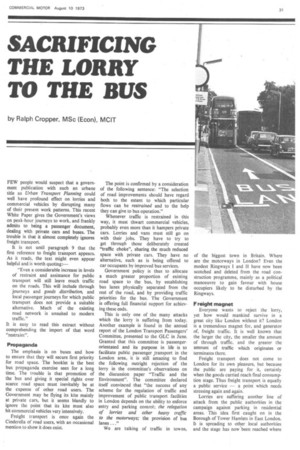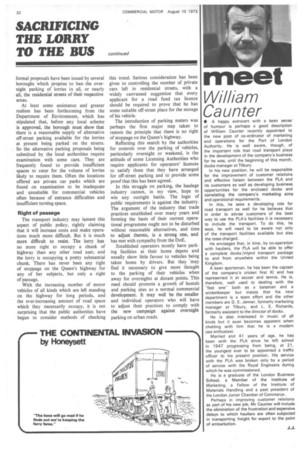SACRIFICING THE LORRY TO THE BUS
Page 33

Page 34

If you've noticed an error in this article please click here to report it so we can fix it.
by Ralph Cropper, MSc (Econ), MCIT FEW people would suspect that a government publication with such an urbane title as Urban Transport Planning could well have profound effect on lorries and commercial vehicles by disrupting many of their present work patterns. This recent White Paper gives the Government's views on peak-hour journeys to work, and frankly admits to being a passenger document, dealing with private cars and buses. The trouble is that it almost completely ignores freight transport.
It is not until paragraph 9 that the first reference to freight transport appears. As it reads, the text might even appear helpful and is worth quoting:— "Even a considerable increase in levels of restraint and assistance for public transport will still leave much traffic on the roads. This will include through journeys and goods distribution, and local passenger journeys for which public transport does not provide a suitable alternative. Much of the existing road network is unsuited to modern traffic."
It is easy to read this extract without comprehending the import of that word "restraint".
Propaganda The emphasis is on buses and how to ensure that they will secure first priority for road space. The booklet is the best bus propaganda exercise seen for a long time. The trouble is that promotion of the bus and giving it special rights over scarce road space must inevitably be at the expense of other road users. The Government may be flying its kite mainly at private cars, but it seems blandly to ignore the point that its kite must also hit commercial vehicles very intensively.
Freight transport is once again the Cinderella of road users, with an occasional mention to show it does exist.
The point is confirmed by a consideration of the following sentence: "The selection of road improvements should have regard both to the extent to which particular flows can be restrained and to the help they can give to bus operation."
Whenever traffic is restrained in this way, it must thwart commercial vehicles, probably even more than it hampers private cars. Lorries and vans must still go on with their jobs. They have to try to get through those deliberately created "traffic choke", sharing the much reduced space with private cars. They have no alternative, such as is being offered to car occupants by improved bus services.
Government policy is thus to allocate a much greater proportion of existing road space to the bus, by establishing bus lanes physically separated from the rest of the road, and by providing traffic priorities for the bus. The Government is offering full financial support for achieving these ends.
This is only one of the many attacks which the lorry is suffering from today. Another example is found in the annual report of the London Transport Passengers' Committee, presented to the GLC in June. Granted that this committee is passengerorientated and its purpose in life is to facilitate public passenger .transport in the London area, it is still amazing to find the following outright rejection of the lorry in the committee's observations on the discussion paper "Traffic and the Environment". The committee declared itself convinced that "the success of any scheme for the regulation of traffic and improvement of public transport facilities in London depends on the ability to enforce entry and parking control; the relegation of lorries and other heavy tragic to the motorways; the provision of bus lanes ..."
We are talking of traffic in towns, of the biggest town in Britain. Where are the motorways in London? Even the modest Ringways I and II have now been scotched and deleted from the road construction programme, mainly as a political manoeuvre to gain favour with house occupiers likely to be disturbed by the Ringways.
Freight magnet Everyone wants to reject the lorry, yet how would mankind survive in a great city like London without it? London is a tremendous magnet for, and generator of, freight traffic. It is well known that the larger the city, the smaller the amount of through traffic, and the greater the amount of traffic which originates or terminates there.
Freight transport does not come to London for its own pleasure, but because the public are paying for it, certainly when the goods carried reach final consumption stage. Thus freight transport is equally a public service — a point which needs stressing again and again.
Lorries are suffering another line of attack from the public authorities in the campaign against parking in residential areas. This idea first caught on in the Borough of Tower Hamlets in East London. It is spreading to other local authorities and the stage has now been reached where formal proposals have been issued by several boroughs which propose to ban the overnight parking of lorries in all, or nearly all, the residential streets of their respective areas.
At least some assistance and greater realism has been forthcoming from the Department of Environment, which has stipulated that, before any local scheme is approved, the borough must show that there is a reasonable supply of alternative off-street parking available for the lorries at present being parked on the streets. So the alternative parking proposals being submitted by the local authorities require examination with some care. They are frequently found to provide insufficient spaces to cater for the volume of lorries likely to require them. Often the locations offered are private car parks which are found on examination to be inadequate and unsuitable for commercial vehicles often because of entrance difficulties and insufficient turning space.
Right of passage
The transport industry may lament this aspect of public policy, rightly claiming that it will increase costs and make operations much more difficult. But it is much more difficult to resist. The lorry has no more right to occupy a chunk of highway than any other road user, and the lorry is occupying a pretty substantial chunk. There has never been any right of stoppage on the Queen's highway for any of her subjects, but only a right of passage.
With the increasing number of motor vehicles of all kinds which are left standing on the highway for long periods, and the ever-increasing amount of road space which they necessarily occupy, it is not surprising that the public authorities have begun to consider methods of checking this trend. Serious consideration has been given to controlling the number of private cars left in residential streets, with a widely canvassed suggestion that every applicant for a road fund tax licence should be required to prove that he has some suitable off-street place for the storage of his vehicle.
The introduction of parking meters was perhaps the first major step taken to restore the principle that there is no right of stoppage on the Queen's highway.
Reflecting this search by the authorities for controls over the parking of vehicles, particularly overnight or weekend, is the attitude of some Licensing Authorities who require applicants for operators' licences to satisfy them that they have arranged for off-street parking and to provide some proof that this has been agreed.
In this struggle on parking, the haulage industry cannot, in my view, hope to win any outright battle. The logic of public requirements is against the industry. The argument of the industry that trade practices established over many years and forming the basis of their current operational programme ought not to be disturbed without reasonable alternatives, and time to adjust thereto, is a strong one, and has met with sympathy from the DoE.
Established operators mostly have parking facilities at their home depots and usually show little favour to vehicles being taken home by drivers. But they 'may find it necessary to give more thought to the parking of their vehicles when away for overnights at distant points. This need should promote a growth. of hostels and parking sites as a normal commercial development. It may well be the smaller and individual operators who will have to adjust their practices to comply with the new campaign against overnight parking on urban roads.




























































































